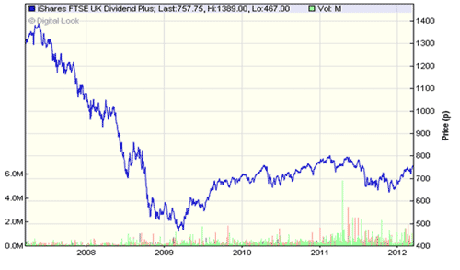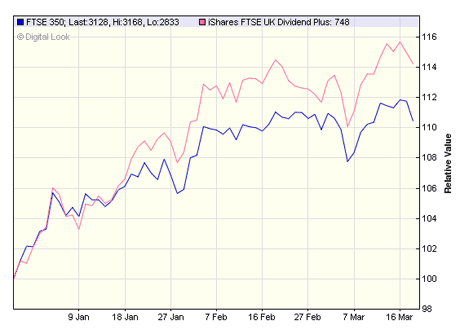Three reasons why investors are about to rush to high yielders
For long-term investors, the uglier the performance chart, the better the investment, says Bengt Saelensminde. Here's three reasons why high-yield stocks are set to soar.
Get the latest financial news, insights and expert analysis from our award-winning MoneyWeek team, to help you understand what really matters when it comes to your finances.
You are now subscribed
Your newsletter sign-up was successful
Want to add more newsletters?

Twice daily
MoneyWeek
Get the latest financial news, insights and expert analysis from our award-winning MoneyWeek team, to help you understand what really matters when it comes to your finances.

Four times a week
Look After My Bills
Sign up to our free money-saving newsletter, filled with the latest news and expert advice to help you find the best tips and deals for managing your bills. Start saving today!
On Monday, I said that I didn't have a problem with Citigroup's forecast, that the FTSE could double over the next ten years. After all, inflation could take care of that for starters.
And to take advantage I suggested we pick up a high-yield stocks exchange-traded fund(ETF).
But having seen the chart of how badly high-yield stocks have done since the great crisis of 2008, one reader asked a pertinent question:
MoneyWeek
Subscribe to MoneyWeek today and get your first six magazine issues absolutely FREE

Sign up to Money Morning
Don't miss the latest investment and personal finances news, market analysis, plus money-saving tips with our free twice-daily newsletter
Don't miss the latest investment and personal finances news, market analysis, plus money-saving tips with our free twice-daily newsletter
Why would anyone want to invest in a high-yield fund that clearly underperforms the market?
Yes, the chart is dire!
Here's the chart I included in Monday's piece.

It Looks terrible, I admit it!
But frankly, a bad-looking chart doesn't put me off not when it comes to long-term investment. Sure, for short-term trading, you've got to be careful. Let the trend be your friend and all that. But for long-term investment, the uglier the chart, often the better the investment. It arouses contrarian instincts.
The fact that high-yielders have done badly over the last few years suggests to me they're likely to outperform over the next few years.
Let me outline three reasons why I think the fundamentals look like they're in favour of yielders.
Forget what's happened, things are changing
The last few years have been what we like to call risk-on' these days. And during risk-on, you expect risky stocks to do well. I don't know if it's just cheap money that brings on the animal spirits in traders, or if it's just wild-eyed investors hankering for the good old days... looking to chase the next growth sector.
But what seems pretty clear is that solid yield stocks certainly didn't hit the radar for these boys.
Yet over recent months the i-shares FTSE 350 dividend plus (pink line) has outperformed its FTSE 350 benchmark to pretty nice degree.
Three-month chart FTSE 350 versus i-shares Dividend Plus

It looks to me like we've got a change of perception here.
I suspect that investors are gradually coming to terms with the long-term nature of the low interest rates. Ever since I've been writing The Right Side I've consistently tried to get across the message that rates will stay lower and longer than anyone realises.
Rates will remain screwed to the floor for as long as the authorities can possibly get away with it.
Now that investors finally understand that Mervyn's 0.5% interest rate is much more than a temporary fix for the crisis, they're starting to get worried. Those that previously avoided equities (hoping that rates on cash would rise) feel forced into stocks to get a return. And of course, they're likely to gravitate to the high yielders.
Basically, the market is filling up with reluctant investors chasing a yield. And as far as I'm concerned, that's going to continue. Sitting on the sidelines with their cash for three years as the equity markets went up has become too painful.
This rather sorry situation might not make you feel much better about piling in, but there's reason for hope.
We've cleared out the rubbish
An ETF is a fund that tracks an index; that is a basket of shares. And the wonderful thing about ETFs is that they don't employ clever City managers to weave their magic (and charge their fees!). No, an index is compiled by the FT and the institute of actuaries. All the ETF provider has to do is invest in the stocks stipulated by the index. And that's all computer driven which, praise the Lord, means fees are generally under 0.5% p.a.
As well as saving us money, the other brilliant thing about index (known as passive) investing is that it takes the emotion out of investment. You see, the index-setters decide which stocks should be in. This decision has no sentiment attached.
It gets around the biggest problem for investors (and that includes the pros): allowing emotions to override logic. In this case, if the index says dump the stock, its dumped. And that's great, because they've recently cleared out a load of rubbish.
Following the 2008 crisis, as many of the big financial companies held back on dividends, they got dumped.
As a result, a fund that went into the financial crisis heavy on financial firms, came out lighter. Of course that meant it had to take considerable losses on these investments. But at least the decision to dump was automated. And hopefully now it's over.
So this index of stocks faces the future with a brighter set of constituents. A set of stocks that are looking distinctly rich.
Companies are sitting on a lot of cash
Many of our largest UK companies have been hoarding cash. Having had a nasty scare during the crunch, they don't intend to get caught with an over-extended balance sheet again. So they sit on cash.
Even those that have borrowings now find that these loans (often corporate bonds) are quite cheap to run. That is helping boost profits.
And to top it all, George Osborne has been busy cutting corporate tax rates. Wednesday's budget saw them cut again. He'd already brought the rate down to 25% and it's now heading to 24%. What's more he intends to bring it down to 22% over the next couple of years. This is all great news for corporate profits and therefore dividends.
Many companies in the Dividend+ index have got loads of cash and can afford to pay dividends several times over. That makes me feel a little more secure about them. If you've been following Stephen Bland's strategy on The Dividend Letter, you'll know that there have been quite a few companies that seriously boosted their dividends in recent months.
But of course, we shouldn't be complacent, in the short run stocks can still crash. And in the event of a crash, I'd rather be sitting on the high-yielders.
Valuations are like a coiled spring
The thing about a yield stock is that a generous yield tends to put a prop under the stock price. Like a spring, you can only compress it so far and then it's set to bounce back. The stocks in the UK Dividend+ index are picked on forward yields that is a yield based on what analysts are expecting them to pay in the year ahead.
That's incredibly important. Historic yields are meaningless if the firm can't afford to pay out in the year ahead. A stock on a high forward yield is less likely to get hammered down into the ground. That's because yield hungry investors ride in and buy stock to secure its dividend income. That's why they're proving resilient now.
Of course it won't all be plain sailing...
Remember, I'm not promoting this as a one-way bet.
You probably don't need me to tell you that stock-market investing can be dangerous. So before I sign off, I just want to make the same points I did earlier in the week.
We could face a crash at any moment the financial system is in a precarious state after all. And my assumption that corporation profits will provide a useful inflation hedge could be wrong. Stagflation could make us suffer inflation with no upside to company profits the FTSE could go nowhere.
And anyway, we may yet see a period of deflation before this decade is out. And that's unlikely to be good news for stocks.
Tread carefully. But if you're looking for a yield of 4.79% (paid quarterly) with the potential to grow your capital, then this looks a reasonable bet to me.
Or you could take Stephen Bland's approach. Buy the shares that are signalling the big dividends this year. Take the regular income. And just forget allabout the market.
Taking the easy way out
It has an appeal that doesn't it? Take the income. And just ignore all the endless chatter about quantative easing(QE), 'risk on' and 'risk off'. Go away and think about the things that are really important. Walk away from it all.
And it works too. I've been following The Dividend Letter for a few years now. And it has a tremendous record so far. I've been told that MoneyWeek and Right Side readers have been joining in their droves of late.
This article is taken from the free investment email The Right side. Sign up to The Right Side here.
Important Information
The Dividend Letter is a regulated product issued by Fleet Street Publications Ltd. Your capital is at risk when you invest in shares, never risk more than you can afford to lose. Please seek independent financial advice if necessary. Fleet Street Publications Ltd. 0207 633 3600.
Your capital is at risk when you invest in shares - you can lose some or all of your money, so never risk more than you can afford to lose. Always seek personal advice if you are unsure about the suitability of any investment. Past performance and forecasts are not reliable indicators of future results. Commissions, fees and other charges can reduce returns from investments. Profits from share dealing are a form of income and subject to taxation. Tax treatment depends on individual circumstances and may be subject to change in the future. Please note that there will be no follow up to recommendations in The Right Side.
Managing Editor: Frank Hemsley. The Right Side is a regulated product issued by Fleet Street Publications Ltd.
Fleet Street Publications Ltd is authorised and regulated by the Financial Services Authority. FSA No 115234. https://www.fsa.gov.uk/register/home.do
Get the latest financial news, insights and expert analysis from our award-winning MoneyWeek team, to help you understand what really matters when it comes to your finances.
Bengt graduated from Reading University in 1994 and followed up with a master's degree in business economics.
He started stock market investing at the age of 13, and this eventually led to a job in the City of London in 1995. He started on a bond desk at Cantor Fitzgerald and ended up running a desk at stockbroker's Cazenove.
Bengt left the City in 2000 to start up his own import and beauty products business which he still runs today.
-
 Should you buy an active ETF?
Should you buy an active ETF?ETFs are often mischaracterised as passive products, but they can be a convenient way to add active management to your portfolio
-
 Power up your pension before 5 April – easy ways to save before the tax year end
Power up your pension before 5 April – easy ways to save before the tax year endWith the end of the tax year looming, pension savers currently have a window to review and maximise what’s going into their retirement funds – we look at how